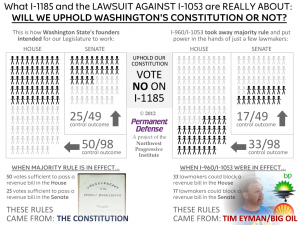June 9th, 2016
NPI applauds Attorney General Bob Ferguson for going to court to put an end to Tim Eyman’s stonewalling
In the Courts
Following Attorney General Bob Ferguon’s announcement today that his office has filed motions in Snohomish and Thurston Superior Court to enforce subpoenas issued as part of the state’s investigation into Tim Eyman’s egregious violations of Washiington’s public disclosure laws, the Northwest Progressive Institute called on Eyman and his associates to stop stonewalling and cooperate fully with investigators.
“We commend Attorney General Ferguson for going to court to compel Tim Eyman to turn over the records needed to investigate the illegal concealment uncovered by the Public Disclosure Commission during its investigation into the 2012 I-517 and I-1185 campaigns,” said NPI founder and Executive Director Andrew Villeneuve.
“Today’s court filings make it plainly clear that Tim Eyman has been incredibly uncooperative with the Attorney General’s investigation since it began last autumn. He has refused to turn over documentation that would reveal what really happened. What little he has produced has been heavily redacted, suggesting he and is attorney are trying to drag this out as long as possible, and increase the cost of the investigation to taxpayers.”
“This stonewalling is completely unacceptable, and it needs to end immediately.”
“If Eyman expects to be exonerated, as his attorney Mark Lamb has previously said, then why is he refusing to cooperate with the state’s investigation? We can only conclude that it is because the evidence will show that Eyman is guilty of the charges against him, and Eyman wants to put off his day of reckoning for as long as possible. But that day is coming, and Eyman can’t stop it.”
Earlier today, in a related development, the Public Disclosure Commission (PDC) notified Washingtonians For Ethical Government (WFEG) that it has opened an investigation into its allegations that Tim Eyman again broke the law by failing to report the launch of an April 2016 independent expenditure against several dozen Democratic state legislators, and for failing to include required disclosures in the ads produced as part of the expenditure.
WFEG notified Attorney General Bob Ferguson and Prosecuting Attorney Dan Satterberg on May 25th in a forty-five day notice letter that it would bring a citizens’ action against Eyman in Superior Court if the state did not take action against Eyman. On June 7th, 2016, the Attorney General referred the matter to the PDC for review. The PDC has now opened an investigation into the allegations and assigned a case number — 5729.
“We are pleased to hear that the PDC is investigating Eyman’s most recent public disclosure law violations,” said Villeneuve, who serves as a boardmember of Washingtonians For Ethical Government. “Tim Eyman is a serial offender who needs to be held accountable. He has been given plenty of opportunities to clean up his act, and he has failed to do so. He should be penalized to the maximum extent the law allows for these violations, as well as his previous violations.”


